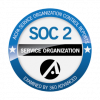A look into Danske bank
Danske Bank is a Danish multinational banking and financial services corporation. It was founded in 1971 and is the largest bank in Denmark. They have banks in Finland, Norway, Sweden, Lithuania, Poland, the United Kingdom, Northern Ireland, Ireland, India, and New York. Danske Bank is currently being sentenced due to non-compliance with Anti-Money Laundering (AML) regulations.
Sampo Bank creating Anti-Money Laundering problems for Danske
In 2007, Danske acquired Sampo Bank in Estonia, also known as Danske Estonia. They offered services through a subsidiary in Estonia until mid-2008. Danske then moved its operations to a branch headquartered in Estonia through its International Banking Group (IBG). The International Banking Group operates the Danske Estonia branch as a Non-Resident Portfolio, also known as NRP.
Although NRPs are very profitable, NRP consumers are located in high-risk jurisdictions. The NRP customers conducted business with U.S. dollars, requiring Danske Estonia to use three U.S. banks in the Southern District of New York (SDNY) to process transactions.
To open accounts, NRP customers were not required to complete a know-your-customer (KYC) review. In a Ballard Spahr article titled “SDNY Sentences Danske Bank in Massive AML Scandal” by Kaley Schafer and Peter D. Hardy states, “Danske Estonia was aware of NRP customers engaged in suspicious and potentially criminal transactions through internal audits” (Kaley Schafer and Peter D. Hardy, 2023).
Anti-Money Laundering Concerns
Anti-Money Laundering concerns started to rack up for Danske Estonia. The Central Bank of Russia sent a letter about transactions that have “doubtful origin” (Kaley Schafer and Peter D. Hardy, 2023). In the article it mentions that the Estonian Financial Supervisory Authority said, “Danske Estonia’s Policies were “mostly in compliance” (Kaley Schafer and Peter D. Hardy, 2023). Then, the Danish Financial Supervisory Authority also shared concerns in that they issued a report concluding that Danske Estonia allowed economic pursuits to overshadow due diligence. One important aspect is that Danske Estonia did not notify the banks in the United States of these AML concerns. This means that U.S. banks continued to process illegal transactions, even though Danske Bank knew they weren’t meeting compliance regulations.
Although there were multiple warnings, the bank’s former Estonian branch is said to have processed suspicious transactions totaling several hundred billion.
Repercussions of “Mostly in Compliance”
Danske Bank closed its Estonian Branch and was sentenced in the Southern District of New York to 3 years of probation and owes over 2 billion dollars. As a result of the sentencing, Danske Bank was ordered to make a payment of over $1 billion. The bank received credit for the rest of the owed money, promising to pay $178.6 million to the Securities and Exchange Commission and $672.3 million to Denmark authorities.
How TTI can help
Small branches can pose a particular risk for money laundering without sufficient oversight. Truth Technologies ‘provides software to help prevent financial crime within your organization. Contact us today for a free demo and see how we can help your organization adhere to the Bank Secrecy Act and AML/KYC regulations.
For more information, click here:





